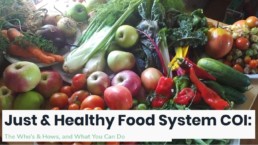Growing Tacoma’s Just and Healthy Food System
Growing Tacoma’s Just and Healthy Food System
Year Complete: 2019
Grant Amount: $45,000
Local Government: City of Tacoma, WA
Local Foundation: The Greater Tacoma Community Foundation; The Russell Family Foundation
Project Purpose
To support community members’ research, and provide them the tools, resources, and influential audience needed to implement resilient food system ideas and projects.
Key Lessons Learned
Lessons about strategies, tools, and tactics that other sustainability directors could use
to advance their work.
- Lean on community-based organizations (not necessarily non-profits) and contract with them in the same way cities would with outside agencies. There is a difference between hiring an agency and hiring community members who live and experience the topic first-hand. It covers an aspect of equity to contract with community members who have lived experience by providing them the funds and resources to enact change with the heart, cohesion, and authenticity that can make lasting programs.
- Example: People experiencing hunger can tell you most easily about specific systems or processes impacting them, and almost always have innovative and thoughtful ideas on how best to break/remake them. They can make good thought partners with existing agencies. The caveats to this is to pay them – not in stipends or gift cards, but in actual contracts like those awarded to agencies/institutions and universities. Sometimes the solution is as simple as asking those most impacted and trying things they suggest.
- Find ways undo barriers instead of turning down community member ideas when they don’t fit in the current system of how a city operates.
- Take care to notice and address power dynamics in the room and build in a system to ensure that community member needs are noted, thought through, and discussed. It won’t matter if you’ve sought out and contracted with a community member or group if the staff on hand subconsciously sees themselves as more educated (or “higher”), or more in-the-know about how the city works than the community members in the room.
- Lean on the Equity and Diversity, Equity and Inclusion initiatives. Then go further.
- Allocate staff time to be available to and support community-based organizations. Use of participatory budgeting processes support community input, buy-in, and implementation to advance shared priorities to make a more just and equitable system. This process also supports leadership and related skill development in the community.
Lessons for developing a collaborative relationship between a local government sustainability director and local place-based foundation(s)
- Ensure that staff at city and foundation understand that once you give community members the reigns, staff must work with them to be flexible/adaptable to make their projects happen. This is the first step in undoing current institutional systems.
- Find ways to provide resources with as few strings attached as possible. This allows community members to fulfill a wide range of activities within a project with as few barriers as possible. It boosts community member morale, leaves people with the feeling that they were heard, then gives an opportunity for their work or idea to be actualized.
- Hire community member staff or liaisons that have strong understandings of systemic oppression with clear ties to their respective communities and lived experience around the project’s foundations.
- It takes time and informal interactions to build trusting, meaningful relationships with community groups.
Additional Information and Resources
Learn more about Tacoma’s Environmental Action Plan and other equity and sustainability initiatives here.

